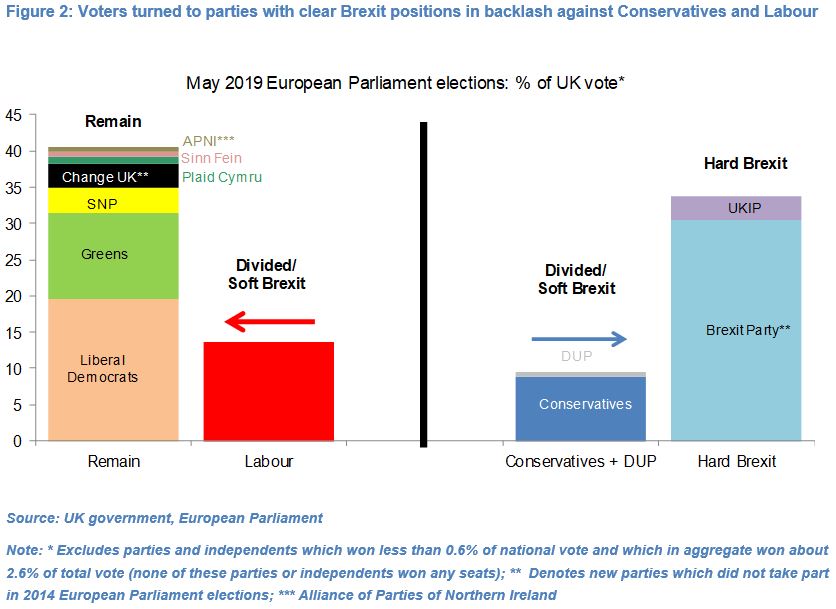Brexit: Greater standard deviation and skew pointing to second referendum
The recent local elections and European Parliament elections and Prime Minister Theresa May’s announcement a week ago that she would resign on 7th June have materially altered the probability distribution of the possible Brexit outcomes, in our view.
British voters threw their weight behind parties which unequivocally back either i) a “no-deal” Brexit – namely Nigel Farage’s newly formed Brexit Party, or ii) a second referendum and the UK remaining in the EU – namely the Liberal Democrats and Green Party.
Conversely, the ruling Conservative Party – which has failed to deliver Brexit – and the opposition Labour Party – which has until recently sat on the Brexit fence – suffered severe electoral backlashes in both the 2nd May local elections and 26th May European elections.
In response, most of the twelve contenders to succeed Theresa May, including front-runner Boris Johnson, have hardened their views on Brexit by stating or implying that while a deal was preferable they were willing to see the UK leave the EU without a deal on 31st October.
Conversely, the Labour Party’s most senior shadow cabinet members, including leader Jeremy Corbyn, have now put their weight behind a confirmatory second referendum even if the party has so far stopped short of formalising this position.
Given this greater electoral and political polarisation of views on Brexit, we think the odds of the UK leaving the EU with a deal have diminished even further in recent weeks. Conversely, the odds of the more “extreme” scenarios – a “no-deal” Brexit or a second referendum – and thus the standard deviation of possible Brexit outcomes have increased.
However, we think the odds of a second referendum have increased more than the odds of a “no-deal” Brexit with the latter still modest. The pro-remain Liberal Democrats and Green Party were the clear (net) winners of the local elections and the pro-remain parties won over 40% of the vote in the European elections, versus 34 % for “hard” Brexit parties.
Put differently, the shift in skew points to a second referendum – our core scenario since last December (see Tuesday 11th December: Brexit D-Day, 4th December 2019).
This is a summary – Read the full research piece here

Olivier is an economist and rates & FX strategist with over 22 years experience in financial markets. He is Director and Founder of 4X Global Research, an independent, London-based consultancy which provides institutional and corporate clients with substantive research, high-quality analysis and insight on emerging and G20 economies and financial markets.
